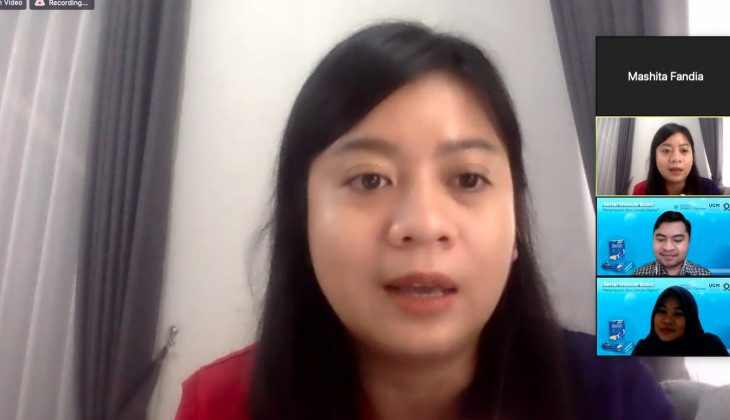The Master’s Study Program of the Department of Communication Science (Dikom) UGM held a book discussion entitled “Dimensions of Knowledge and Competence of Digital Literacy” on Friday (16/7). This discussion is the second in a series of discussions on the book “Women and Digital Literacy: Between Problems, Barriers, and Directions for Empowerment,” written collaboratively by lecturers, students, and alumni of the department. This event was supported by the Network of Digital Literacy Activists (Japelidi) and UGM Press.
In this discussion, three resource persons were present as book authors and lecturers at the UGM Department of Communication Science. They are Zainuddin Muda Z. Monggilo, Syaifa Tania, and Dewa Ayu Diah Angendari. In addition, there was also a lecturer in Communication Studies at Universitas Sam Ratulangi Manado, and Leviane Hera Jackelin Lotulung, as discussion speaker.
The second part of the book is about the writers’ concerns regarding the digital phenomenon faced by women, briefly explained by Zainuddin Muda.
“Women are increasingly being seen as objects of digital literacy. I believe that there are more women out there who may not have been exposed to the media while they had carried out consistent digital literacy activities,” said Zainuddin.
The three cases that Zainuddin highlights in his chapter include the hoax about Ratna Sarumpaet, the demonstrations and riots in Papua 2019, and other hoaxes related to SARA and politics.
The second resource person Syaifa Tania continued the discussion. She wrote about the role of women in the context of digital marketing communications. According to Tania, social media in its current development, whatever its form, is always looking for gaps as a medium of marketing communication, which is becoming more and more refined by the day.
“In its development, women have a large portion as influencers, not only as consumers but also as producers of commercial marketing communications,” she said.
Meanwhile, Diah Angendari wrote about the use of information and communication technology by women in rural areas as part of collaborative research between the Center for Digital Society (CfDS) UGM and Amarta. Diah conducted a case study research on female users of peer-to-peer lending based on financial technology.
Diah highlighted the anxiety that arose due to the digital divide in Indonesia, more specifically, the gap in ICT use between lenders and borrowers. Lenders are literate to use the dashboard and its features, but only a few borrowers can use the ICT.
The big digital divide in Indonesia, especially in the use of Amarta’s ICT between creditors and debtors, is Diah’s concern. The creditors, in this case, are already literate to operate the dashboard, while only a few debtors, the majority of whom are women, can employ ICT.
“Access is one of the important factors or the entrance,” said Diah.
Jackelin Lotulung as the discussant explained that women in the village experience gaps in education, knowledge, and digital literacy.
“Because in the city, women have more advanced knowledge. We could do better empowerment in the village when digital literacy becomes necessary. There are still obstacles in the village, especially related to the network. We all have to work on it together,” she explained.
Source: https://ugm.ac.id/id/berita/21406-dimensi-pengetahuan-dan-kompetensi-literasi-digital



